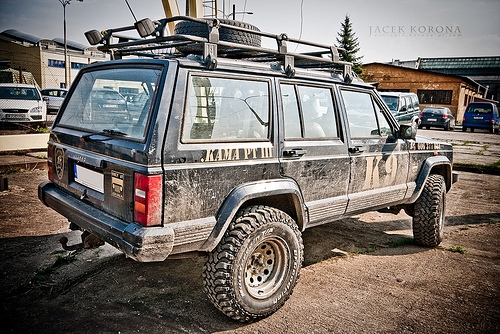
The four wheel bearings on your car allow it to move. Bearings not only support the weight of your vehicle, they allow your wheels to rotate without friction. Even though passenger car wheel bearings are lubricated and sealed at the factory, and designed to last at least 100,000 miles, when they fail the results can be deadly. Unsealed bearing are usually found on the front wheels of four-wheel drive vehicles with locking hubs.
Wheel bearings keep the wheels on your vehicle. Given this important job, bearings are surprisingly simple in design. They consist of an outer bearing, an inner bearing and a seal. Each set of bearings contain rollers that allow your vehicle to travel smoothly down the road. Proper installation of these bearings, and keeping them greased, is essential to avoid catastrophic failure.
If your bearings are going out, usually the first thing you will hear is a low growling or humming noise coming from the wheel. At highway speeds, this warning noise may not be audible; therefore, it's essential to check regularly for bearing noise. With every oil change, it's a good idea to spin each wheel by hand when the car is jacked up. If you hear a grinding or growling noise it could be worn bearings.
Also during oil changes, grasp each wheel and check for any sign of wobble, top to bottom and side to side. Bearings that have lost their grease and have become damaged from excess heat may become loose and the entire wheel will wobble slightly. If your wheels are not tight, perform an inspection on each one that wobbles and either repack or replace the bearings.
Because water and grease don't mix, boat owners who trailer their boats and submerge the bearings while launching almost always attach Buddy Bearings. Buddy Bearings are spring loaded attachments that fit on the outside of the wheel hub, and are fitted with grease fittings. Special water resistance grease (blue grease) must be used for boat trailers, but it also will liquefy eventually. When the bearings need to be greased, the outside seal of the spring compresses in toward the bearing. Add a few pumps of grease with a hand-operated pump gun to load additional grease, which is slowly fed to the bearings via the springs' pressure.
Considering that wheel bearings not only hold your cars wheels on and provide a smooth spinning action for your tires, many mechanics prefer to replace bearings rather than repack them with grease. This opinion does seem logical given the fact that you've already dismantled the hub assembly and have the bearings out for inspection. Even the slightest damage to the rollers will make repacking a wasted effort, so it's probably best to spend the few dollars extra and install new bearings.